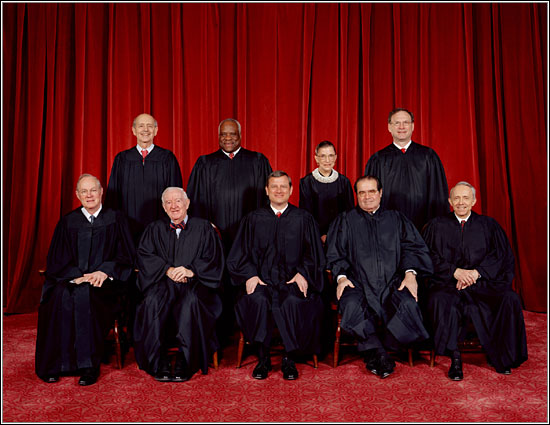Edited by Jessica Boesl

Obama is going through a tough time. The Democrats lost the emblematic seat Ted Kennedy occupied in the Senate for forty-five years. Hours later, the Supreme Court decided to authorize corporations to spend money in favor of the political candidates of their liking and to invest against those opposed to their interests.
If we review the history of the United States, the Supreme Court has written some of the most important pages on democracy and justice. Admired by political systems worldwide, this court also has the disgrace of being the author of some of the most shameful episodes.
Such is its power that it caused the American Civil War with its decision on the Dred Scott case. Later, it was responsible for the doctrine of segregation with its Plessy ruling, which created “separate but equal.” Pursuant to this ruling, the public installations of blacks were separate, although theoretically equal to those of whites. Schools, transportation and theaters in the South were separate, but never equal. Chief Justices of the Supreme Court Taney and Fuller have the disgrace of having presided over courts that legalized slavery and racial segregation. On the other hand, John Marshall and Earl Warren have gone down in history as the noble judges who fought for truth and justice.
With its foundations in the freedom of speech, the current court voted 5-to-4 to allow corporate campaign spending, so as to not violate corporations’ First Amendment rights as if they were people. Justice Sotomayor, appointed by Obama, voted against this ruling. The doors for corporate campaign spending have been opened, with mid-term elections just around the corner. The ruling will allow special interest groups and lobbyists in Washington to have potent tools to influence the vote of legislatures in favor of their projects. Lobbyists will be able to tell those who oppose them: if you vote against such and such project, we have the institutional capacity to spend millions in campaigns against you so that in the next elections you loose your seat. How about that?
During the presidency of Gerald Ford, the court made a similar ruling against electoral reform, which limited financial contributions made to campaigns. Justice White received a call from Ethel Kennedy, the wife of assassinated Robert Kennedy. She angrily complained to him about the ruling, which, according to the widow, went against the democratic reform set forth by the Democratic party. White told her not to worry. The court’s decision, similar to the current court’s, would allow wealthy and powerful groups, like the Kennedys, unlimited campaign spending.
This decision might make the Obama Court one of the ugly ducklings of American democracy and justice. It is the same court that voted 5-to-4 to stop the recounting of votes, which secured Bush’s victory over Gore. Obama has two options: to push new legislation in Congress or wait for changes in the composition of the court.
As a legacy, Bush left Obama the economic crisis and another heavy burden, the court’s conservative majority. Obama will have to wait for nature to run its course. Of the nine Justices, John Paul Stevens was born in 1920 and Justice Ruth Bader Ginsburg has pancreatic cancer. For the time being, Republicans are setting the agenda in the Supreme Court. Obama, desperate, has no other choice but to wait.

Leave a Reply
You must be logged in to post a comment.